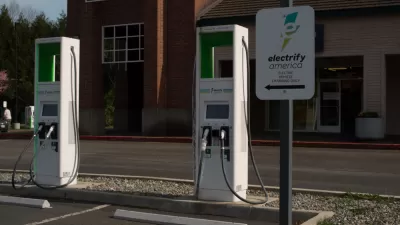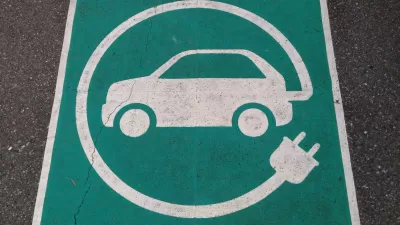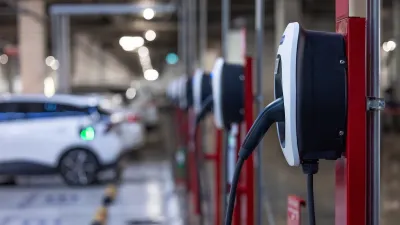More electric vehicles on the road will mean more demand for charging stations where drivers can power up away from home.

"With carmakers and state and federal government entities increasingly looking to combat carbon emissions with electric vehicles, one of the major sticking points to their widespread adoption remains the nation’s undersized and spotty charging infrastructure." As Planetizen previously covered, more private companies are stepping in to fill the gap and position themselves as key players in the growing electric infrastructure industry.
Jamie Lincoln Kitman reports on one such company, Charge, which "is offering a nationwide soup-to-nuts service that provides siting, planning, permitting and construction of E.V. charging stations."
"According to the Energy Department, there are roughly 50,000 (overnight or workday) Level 2 charger locations in service in the United States and Canada, and about 7,000 Level 3 fast charger locations, of which 1,400 are part of Tesla’s supercharging network," far short of the 500,000 proposed by President Biden and the millions needed to provide comprehensive coverage. Kitman writes that "Mr. Fox and Mr. LaNeve anticipate that eight million to 10 million chargers will be installed across the country over the next 15 or so years. They foresee a constantly changing parade of new technologies and a broad array of places where charging stations might be located, including hotels, supermarkets, health clubs and office buildings."
In the article, Charge chief executive Andrew Fox likens EV charging to cell phone coverage. "It’s like if you were trying to use a cellphone to go cross-country 30 years ago. You got expensive charges for roaming, you got dropped calls." Now, coverage is, for the most part, ubiquitous.
FULL STORY: When Electric Cars Rule the Road, They’ll Need Spots to Power Up

Alabama: Trump Terminates Settlements for Black Communities Harmed By Raw Sewage
Trump deemed the landmark civil rights agreement “illegal DEI and environmental justice policy.”

Study: Maui’s Plan to Convert Vacation Rentals to Long-Term Housing Could Cause Nearly $1 Billion Economic Loss
The plan would reduce visitor accommodation by 25% resulting in 1,900 jobs lost.

Planetizen Federal Action Tracker
A weekly monitor of how Trump’s orders and actions are impacting planners and planning in America.

Waymo Gets Permission to Map SF’s Market Street
If allowed to operate on the traffic-restricted street, Waymo’s autonomous taxis would have a leg up over ride-hailing competitors — and counter the city’s efforts to grow bike and pedestrian on the thoroughfare.

Parklet Symposium Highlights the Success of Shared Spaces
Parklets got a boost during the Covid-19 pandemic, when the concept was translated to outdoor dining programs that offered restaurants a lifeline during the shutdown.

Federal Homelessness Agency Places Entire Staff on Leave
The U.S. Interagency Council on Homelessness is the only federal agency dedicated to preventing and ending homelessness.
Urban Design for Planners 1: Software Tools
This six-course series explores essential urban design concepts using open source software and equips planners with the tools they need to participate fully in the urban design process.
Planning for Universal Design
Learn the tools for implementing Universal Design in planning regulations.
Caltrans
Smith Gee Studio
Institute for Housing and Urban Development Studies (IHS)
City of Grandview
Harvard GSD Executive Education
Toledo-Lucas County Plan Commissions
Salt Lake City
NYU Wagner Graduate School of Public Service





























